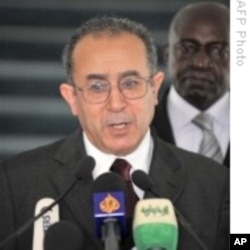The African Union said it wants former Niger President Mamadou Tandja released from further detention.
The 71 year-old Tandja, who was overthrown in a February 18 coup d’état is being held in a presidential building in the capital, Niamey.
African Union Peace and Security Council Chairman Ramtane Lamamra said Mr. Tandja should be freed for humanitarian and reconciliation reasons.
“From the point of view of national reconciliation and the need for appeasement so that they (the military junta) can succeed in conducting a transition, we think that it would be appropriate of course for him as well as for other former leaders of the country to be released,” he said.
Lamamra said the African Union was not trying to impose any demand on Niger’s transitional government.
“We are not imposing anything on governments of our member states. My understanding is that there is no specific threat to the public order, to the security of the country. And therefore as part of the need to promote national reconciliation and to promote some sort of a new beginning for the country, the best way to move forward would be not to be returned back from consequences of the previous area,” he said.
Lamamra would not say whether the African Union would like to see former President Tandja sent in exile following his return.
“It’s not for me or the AU to determine. I think this is a country (Niger) which has shown to know that in knows how to face bigger challenges regarding the domestic situation and the regional environment,” he said.
The military junta has named a cabinet and promised a short transition period. But it has not said when it hopes to return Niger to constitutional rule.
Lamamra said the African Union welcomes the number of positive commitments made so far by the military junta, including the decision not to stand for election and the promise to fully address the root causes of the crisis in Niger.
However, he said the African Union intends to enforce its policy of non-constitutional change of government.
“Due notice has to be taken of the fact that the African Union doctrine stipulates that the timeframe for restoring constitutional order should not exceed six months,” Lamamra said.





